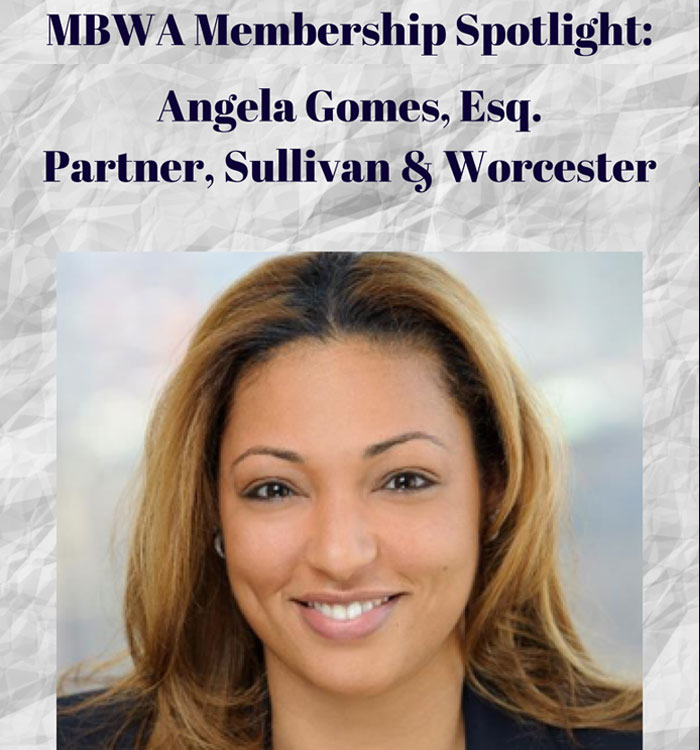News

MBWA would like to congratulate member Angela Gomes on attaining partnership at international law firm Sullivan & Worcester!

How did you get into corporate law?
I actually went to college to be a pediatric surgeon, but quickly realized that that career wasn’t for me. After going back to the drawing board and exploring some other classes in undergrad, I took a corporate paralegal class in which we read Barbarians at the Gate – a book about the takeover of Nabisco. I found the book fascinating and thought I would enjoy helping companies buy and sell other companies, even if sometimes it is against their will. So I went to law school with a desire to pursue a career in mergers and acquisitions. I ended up getting a summer associate position at Skadden Arps, one of the top firms for M&A, and went on to start my career there after law school. While at Skadden, in addition to transactional work, I also handled corporate governance and securities regulation matters, as well as corporate finance.
How has your identity as a black woman influenced your practice?
My identity as a black woman has always been a part of my life at the firm and legal career, in general. For many years, I was the only black woman in the office, and, although I did not feel as if I was treated differently in my practice because of it, I took it as a personal challenge to increase the diversity in the office. When I left Skadden, there were over 15 diverse attorneys, including 4 black women, out of approximately 50 attorneys.
What does it mean to be a black female attorney to you?
Being a black female attorney to me means constantly demonstrating that you are just as good as your white and male counterparts, while also working hard to gain the respect of your clients. It also means lifting as I climb and making sure that the path remains open and clear for those coming behind me.
How have your mentors helped you in your career?
I have been fortunate to have many mentors throughout my career – both internally and externally. Some of the best advice I received was to make sure that I had a board of mentors. These mentors have helped me to navigate firm politics and difficult situations, have given me access to leadership opportunities and have given me endless support and career advice. They have also become good friends and confidants. In addition to having mentors, I also had, and believe it is extremely important to have, at least one sponsor. This is someone who, in addition to caring about you and your professional development, also has the capital whether at your organization or elsewhere to help you achieve those goals. This is the person who can speak on your behalf when you are not in the room.
What advice do you have for someone looking to become a partner?
There are definitely the base level of qualifications: do excellent work and develop relationships with clients and potential clients such that you earn their trust and respect and can turn that into the ability to develop your own business when the time comes. In addition, and, perhaps more importantly, I would say is to communicate your goals to the firm early and often, and to be open and flexible as to what the path to partnership will look like for you. I believe black lawyers, especially women, are less likely to verbalize their goals to their employers, while our counterparts, especially men, make their goals clear from early on in their careers and demand updates on what they need to do to achieve their goals. Also, don’t expect that your path to partnership will be a straight line (from summer associate to associate to counsel to partner) at the same firm. Always keep yourself open to opportunities to grow your skills or advance towards your goal. That may mean multiple firms or an opportunity in the public sector or in-house before achieving partnership. Also, it is equally important to have a plan for how you will be successful once you make partner and have the pressure to develop and sustain business.
Now that you’re partner, where do you see your career in the next ten years?
Right now, I am just focused on continuing to provide my clients with excellent service and developing my skills as a partner and my book of business. I look forward to continuing to build my practice with my new colleagues and see where the next chapter leads me. In addition, now that I have again found myself being the only black woman attorney at Sullivan, I plan to work with the firm to increase the diversity at the firm specifically and in Boston generally. There is still much more work to do in this area and I would like to see the number of black women partners at Boston law firms increase significantly from the current 6 in that timeframe.